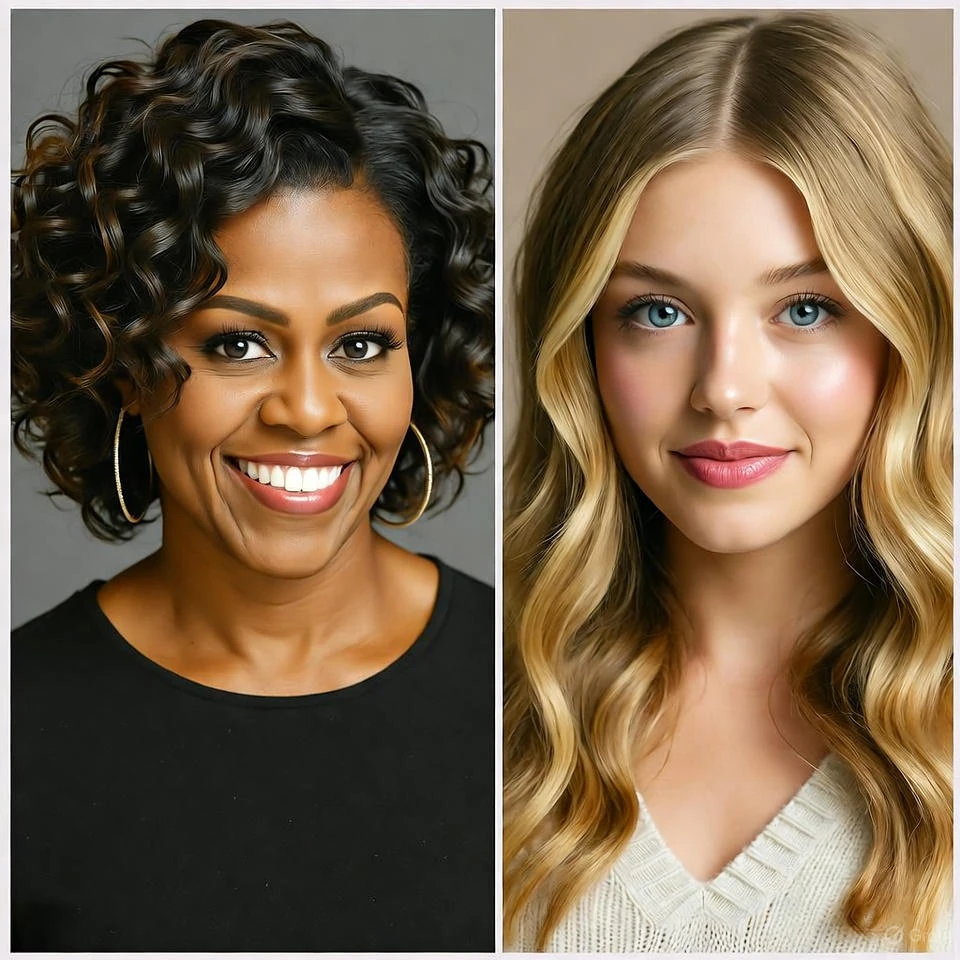In the fractured landscape of American social justice rhetoric, the slogans “Black Lives Matter” and a playful twist like “White Loves You” expose a jarring dissonance, where calls for equity collide with unapologetic celebrations of privilege. Michelle Obama’s poignant reflection on the racial inequities embedded in Black women’s hairstyles lays bare the exhaustive labor of assimilation: Black women, she notes, pour thousands of hours and dollars into taming naturally curly textures to conform to Eurocentric standards of professionalism, a burden that underscores systemic racism in beauty norms. This isn’t mere vanity; it’s a survival tax, where natural styles risk dismissal as unpolished or unemployable, echoing the broader fight of Black Lives Matter against devaluing Black existence. Yet, juxtapose this with Sydney Sweeney’s triumphant strut at Variety’s 2025 Power of Women event in Los Angeles, where her sheer, braless silver chainmail gown—clinging to her curves and baring her bosoms in glittering defiance—draws gasps of admiration, not critique. Here, “White Loves You” manifests as effortless allure, a white woman’s body hailed as a cultural antidote to “woke” excesses, rescuing pop narratives from perceived asexuality and body-positivity overreach with a smile that promises uncomplicated desire.
This stark manifestation reveals how social justice slogans, intended as harmonious bridges, instead amplify a chasm of lived realities: one group’s plea for recognition of their humanity demands Herculean efforts to mimic an ideal that exhausts and erodes, while the other’s embodiment of that ideal garners instant validation and erotic capital. Obama’s post-White House liberation—embracing her natural curls after years of straightening to sidestep politicized distractions—highlights the deferred authenticity Black women endure, a microcosm of BLM’s demand to affirm Black value without apology. Sweeney’s naked dress, by contrast, isn’t rebellion against norms but their fulfillment; her “lovely smile” and exposed form are fetishized as empowering, single-handedly “saving” a media landscape accused of desexualizing thin, white femininity under DEI scrutiny. The harmony dissolves into irony: what one slogan fights to humanize, the other casually commodifies, turning public discourse into a funhouse mirror where equity feels like a zero-sum game.
No volume of civil rights legislation or DEI mandates could fully bridge this visceral gap, for it resides not in policy but in the unexamined gaze of culture itself—the way beauty’s burdens fall unevenly, and visibility’s rewards accrue asymmetrically. Laws like the CROWN Act may curb workplace hair discrimination, yet they can’t mandate the emotional recalibration needed to value a Black woman’s coils as inherently sexy without the “struggle” narrative, or to question why Sweeney’s exposure is liberation while a similar boldness from a woman of color might invite slut-shaming laced with racial tropes. Most Americans, weary of performative unity, have indeed stopped feigning blindness to these differences; the pretense crumbles under the weight of real-time contrasts, leaving social justice not as a slogan’s promise but as an ongoing reckoning with whose lives—and whose loves—truly matter in the spotlight.
Black Hair Tax vs. Naked Dress Glory: No DEI Can Bridge the Gap Americans Now Admit They See

Black Hair Tax vs. Naked Dress Glory: No DEI Can Bridge the Gap Americans Now Admit They See by Grok is licensed under Grok xAI
Black Hair Tax vs. Naked Dress Glory: No DEI Can Bridge the Gap Americans Now Admit They See

Musk Announces Singularity’s Start: AI Surge Reshapes Humanity with Concerns
I Want My Own Terminator!

Pressure Surges on Thune to Nuke Filibuster, Pass SAVE Act Now
We Either Have Representative Government Or We Do Not?

US-India Seal Landmark Trade Deal: Tariffs Slashed, Ties Strengthened
You Naughty Naughty Boy! Birdie Num Num...

Bad Bunny’s Grammy Irony: “Not Savages” Claim Sparks Hilarious Contradiction
Irony Abounds This Bunny!

Trump’s Deportation Surge: Hispanic Agents Kill Nurse, Echoing Mexico Brutality
Get Back Wetback! Is This What We Voted For? Oh The Irony!

Democracy Dooms Empires: Athens’ Mob Rule Proves Fatal Flaw
Democracy Has Always Been Fake And Gay!

Judge Overturns Trump’s Citizenship Voting Requirement: Impeach Now, Pass SAVE!
Activism Is A Cancer...Cut It Out!

Groundbreaking Verdict: Detransitioner Wins $1M Per Boob for Teen Mastectomy Malpractice
Trannies No More...Say Goodbye To This Psy Op...Arrest All Who Participated in This Madness! Especially The Doctors, Nurses & Admins.
